Indigenous leaders are keen to build big careers — and advance the ambitions of their people
These indigenous leaders come from all fields. They’re keen to build big careers — and advance the ambitions of their people.
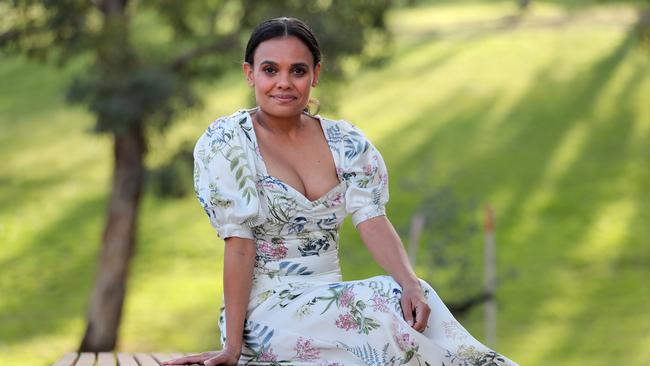
“If a young indigenous Australian is thinking about starting their own business, there’s never been a better time,” says Laura Berry, CEO of Supply Nation, Australia’s number one network of verified indigenous businesses and a key plank in the Indigenous Procurement Policy (IPP) program. “If there’s someone with a great idea or sees a gap in the market and has an entrepreneurial spirit, I would say: ‘Go for it’. There are lots of role models in our sector.”
Berry says the federal government’s IPP and similar state and territory government policies have propelled the sector “to grow really rapidly, and faster than the non-indigenous sector”. Since 2015 the government reports awarding more than 19,527 contracts valued at more than $2.7bn to some 1935 indigenous-owned businesses.
Supply Nation-accredited businesses must be verified to show they are at a minimum 50 per cent indigenous owned. “We’ve seen in the past five years our database of businesses grow from 500-[600 to well over 2500 today,” says Berry. “And we work with more than 450 members, corporates, government organisations and not for profits who’ve made a commitment to purchase goods and services from indigenous businesses.”
Since the pandemic, the Supply Nation site has featured a dedicated area to showcase its network’s suppliers of critical products and services, from PPE and hand sanitisers to IT and teleconferencing. “The pandemic is slowing everything down a little bit, but it also presents opportunity,” Berry says. “We’ve been doing a series of webcasts in collaboration with EY, one of our members, and a lot of the advice from experts is to use this time to tighten up operations, and think about future possibilities for their business as they come out of this. It’s incredibly challenging but it’s not all doom and gloom, and we’re committed to ensuring there’s long-term viability of the sector.”
Barayamal, a unique indigenous entrepreneurship accelerator program founded in 2016 by Dean Foley, also pivoted during the COVID-19 crisis and opened a virtual accelerator, now running online for successful applicants through July. With Barayamal CEO Foley as facilitator, the structured program helps indigenous Australians take their business idea to the next level, with one-on-one coaching on ideation and pitching, and an introduction to the basics of methodologies favoured by digital startups. Foley is a member of Telstra’s Indigenous Advisory Committee and also hosts the Indigipreneur Podcast.
There’s a growing number of initiatives at the big end of town, too.
Last year, the Business Council of Australia launched the Raising the Bar program in conjunction with Supply Nation. Sixteen corporates — including Qantas, Rio Tinto, EY and Westpac — signed up to spend $3bn over five years, with a target to ensure indigenous-owned businesses make up 3 per cent of suppliers.
“As we come out of this pandemic, the indigenous business sector has a lot to offer,” Berry says. “We’re breaking down the stereotypes about indigenous businesses — we don’t have to just go and work for somebody else, or sell art or provide cultural competency training, although those things are important. We have really successful businesses, large and small, who are consistently punching above their weight.”
And of course, many First Nations leaders go it alone and carve their own path.
The actress
Miranda Tapsell: actress, author, produer
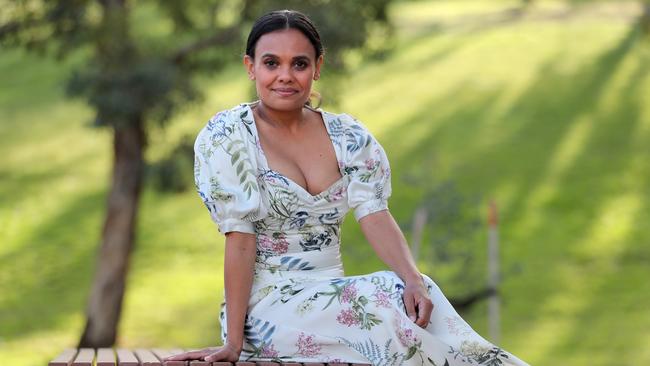
She co-wrote, co-produced and starred in one of 2019’s favourite rom-coms, which has taken almost $6m at the global box office and has done more for Top End tourism than any film since Crocodile Dundee. The reason Top End Wedding was a hit is bleedingly obvious to Miranda Tapsell.
“When you tell strong stories that have universal themes, you will get people flocking to the cinema,” Tapsell, 32, says. “There’s an ethical side to representation: It empowers people and validates them. But having an inclusive story is good business. You don’t have to be Aboriginal to enjoy Top End Wedding or The Sapphires, just like I don’t have to be caucasian or male to appreciate Transformers.”
Tapsell, a Larrakia Tiwi woman who has just released “a deadly memoir”, Top End Girl (Hachette) and will later this year appear on big screens again in director Robert Connolly’s adaptation of Jane Harper’s novel The Dry, reckons she had “a strong vision of what I wanted out of my life since I was 13 years old, even if I didn’t know how I was going to execute that”.
Parents Barbara and Tony set her on track by enrolling her in NIDA school holiday programs in Darwin. “My drama teacher Sally Crawford put me forward to audition for the Bell Shakespeare Regional Scholarship and I’d learnt a Juliet soliloquy by heart,” Tapsell says. “I pulled that out of my back pocket and received that (scholarship).”
She was 16 and NIDA followed at the end of high school. She loved it but realised NIDA’s laser focus on a single craft for students wasn’t going to cut it in the modern age.
“When I graduated, I was told ‘not to wait for the phone to ring’,” she recalls. “So I was, ‘OK, what does that mean? How do I write my own stuff?’ It took me a really long time to trust my own voice.”
Starring in the hit movie of the stage play The Sapphires made her realise strong stories transcend era and race. She was working in Darwin delivering NIDA workshops with fellow NIDA grad Joshua Tyler when they discovered their mutual love of romantic comedies. Says Tapsell: “There are a lot of rom-coms that aren’t particularly good for women to watch, but there are some wonderful ones, like When Harry Met Sally, My Big Fat Greek Wedding and The Apartment, which Josh put me onto.”
By the end of the workshop, “Josh suggested setting a rom-com up in the Territory, and I felt it was the perfect place to set it: the Tiwi Islands, Katherine, Kakadu and Darwin. It’s unique: I love the art, the culture, the singing, the sense of community. I had missed the Territory so much and this was an opportunity to write it a love letter.”
Knowing it was an ambitious project to film in a remote location, Tapsell says she was “really happy when Tourism NT came to the table” as an investor. “The film raised tourism by something like 12 per cent — before coronavirus!”
Her own wedding — to satirist and TV writer James Colley — happened right after the film wrapped. Now she’s looking at next steps.
“I’ve still got a lot to learn, but I’ve been working since I was 13 and have a breadth of experience on stage and screen and I’ve been concentrating on studying the way the people around me work,” she says. “I’ve got to now take that confidence. I know how to create an environment where people are supportive and empathetic, and that will fuel people’s passion for a project. I thrive on that.”
The lawyer
Leah Cameron: founder and principal solicitor, Marrawah Law
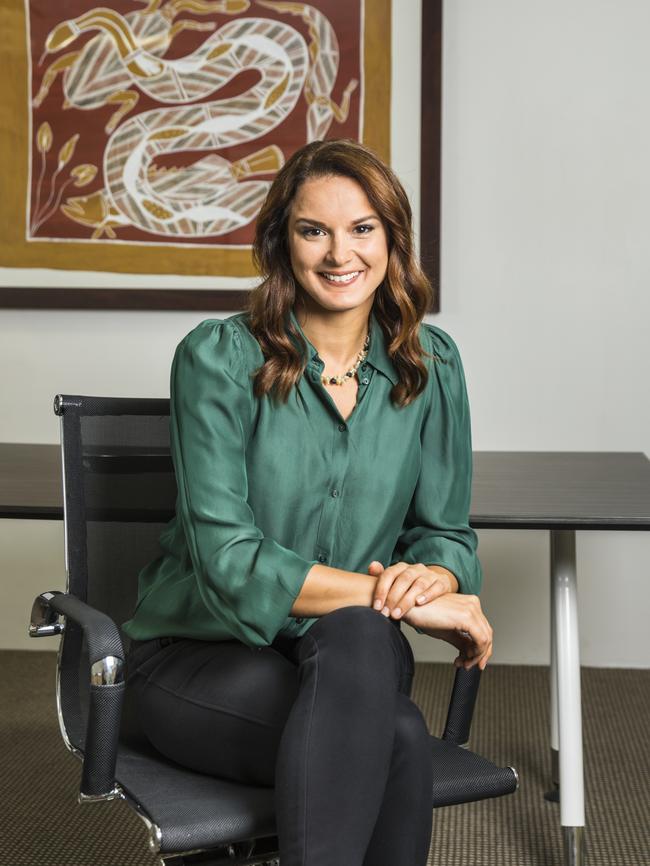
It was 2006 and University of Tasmania law student and Trawlwoolway woman Leah Cameron had been chosen by her community and the Tasmanian Aboriginal Centre to travel to the UK to continue the four decades of negotiations to repatriate human remains.
“We were at Cambridge University and we’d had the opportunity to see some of our old people,” she recalls. “Then an academic came back into the meeting with us and plonked one of our old people’s skulls on the desk, which was just horrendous. She proceeded to look at us and compare us (with the skull) and said that she could totally see how we were Tasmanian, that we were very unique. That’s the kind of people we were dealing with, which was very confronting — I was only in my early 20s.”
Managing director and principal solicitor of her own successful law firm, Marrawah Law, 37-year-old Cameron says she grew up “not even knowing what lawyers were … I was the little girl who had second-hand shoes and had to stuff newspapers in the end to fill the gap to keep my toes warm in the frosty winter mornings. I remember the Scholastic catalogues being sent home … and I would desperately want one of the books. Mum and Dad would scrimp and save so that I could have one new book for Christmas while my friends would have piles of them every term.”
All the same, “I had a really happy childhood, camping, fishing, playing in the bush and hanging out with cousins and friends. And Mum and Dad (Michelle and Greg) were so focused on our schooling — we went without so they could send me and my brother to really good high schools.” Today, Cameron who has two daughters, Isabel, 4, and Ava, 1, is on the Inspiring Old Girls page of Hobart’s St Michael’s Collegiate website.
Not long after graduating with her law degree and hungry to “hit the ground running”, she applied for a job with the North Queensland Land Council and “packed up my little car and drove to Cairns”, where she’s lived since. In 2013 she backed herself and set up her own firm from her kitchen table. Marrawah Law now has a staff of 11 and an enviable list of government and ASX-listed clients; Cameron herself has won numerous awards, including the Attorney-General’s National indigenous Legal Professional of the Year in 2016.
“When we first started, I really wanted to focus on Aboriginal and Torres Strait Islander clients and Native Title matters,” she says. “It’s evolved — my real passion now is commercial law and indigenous businesses and working for government and big corporates and ensuring that projects are run well, that traditional owners are included and that it’s good for everyone on all sides of the transaction.”
Marrawah Law is growing fast. Cameron says: “I’m excited that we will be able to offer more opportunities for First Nations lawyers to work with us in the commercial law space, not just criminal or family law, as we are often pigeonholed into.”
The travel agent
Dwayne Good: founder and executive director, InTravel Group
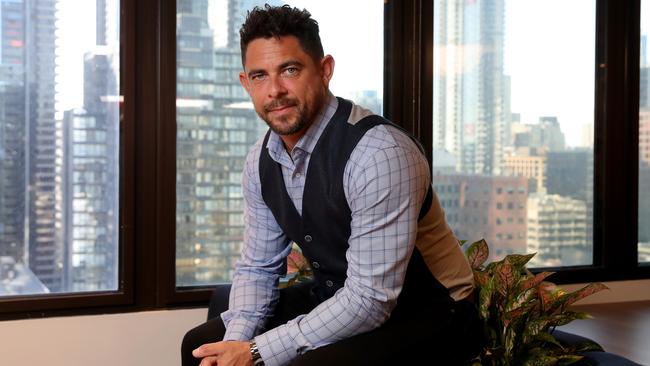
Booking flights and holidays was not something Dwayne Good was at all familiar with as a kid growing up in northern NSW and southern Queensland. By his own telling, he lacked direction and was well into his 20s when a mate who worked at Flight Centre told him he’d make a good travel consultant. Good got the job and “immediately fell in love with it and I knew that was my career path”.
Good, a Bundjalung man, spent seven years with Flight Centre, working his way up from holiday consultant to the corporate division, where he became a B2B sales manager. He loved the culture, the people and the trips.
“A key driver for me trying to get other indigenous people into this industry is that for the right personality, it’s a lot of fun,” he says. “It’s incredibly rewarding and people who work in the travel industry are like-minded — they’re social and super friendly and some of my Flight Centre colleagues are my best friends to this day. But there’s an alarmingly low number of Aboriginal and Torres Strait people working in the travel industry. Flight Centre was a huge company and I reckon I ran into one other indigenous person the whole time I was there.”
In 2014, he opened In Travel Group, the first indigenous-owned travel consultancy, headquartered in Melbourne. In 2018, he partnered as the majority shareholder with a division of Helloworld to open another, Inspire Travel Management, to give him the infrastructure muscle to go after big corporates.
“I’m entrepreneurial by nature, and I like the challenge of creating things that are different, and I wanted to create an indigenous-owned travel agency that competes against some of the biggest companies in the country,” says Good.
Inspire has since landed energy multinational ATCO, CBUS Super and Australia Post as clients. “We’ve taken those contracts off large travel companies, and that is raising the profile of indigenous business people.”
Good has become a mentor in the indigenous business community and sits on numerous advisory boards. Through In Travel Group, he was ready to launch corporate cultural immersion packages with trips to Uluru when the pandemic hit and was forced to “hit pause”. With most travel set to be confined within our national borders for some time, the group is planning a strong return.
“I believe Australians want more indigenous experiences and we will put together an easy way for consumers to purchase those kinds of products,” he says. Australian airlines, “have made a great effort to train and develop indigenous people … now it’s my job to influence the agency side of the industry to do the same. Aboriginal-owned businesses are 100 times more likely to hire other Aboriginal people, so a successful indigenous business sector will help to solve some of the gaps.”
The storyteller
Alison Page: filmmaker, TV host, artist, jeweller, academic
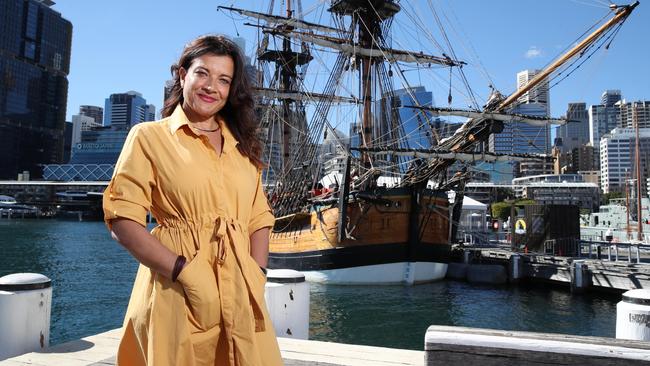
“I’m a shapeshifter — the one consistent thing I’ve done through my career is to tell indigenous stories, but the medium has always changed,” says Alison Page. “It’s a flagship quality of Aboriginal culture and why it’s the world’s oldest living culture — it has always evolved and used new and contemporary mediums to tell ancient stories.”
The latest story creation from Page, a Yuin Waddi Waddi woman, was commissioned by the National Museum of Australia (NMA) to mark the 250th anniversary of British navigator James Cook’s arrival on our shores. Working with her life and creative partner Nik Lachajczak and descendants of those who witnessed Endeavour’s passage up the eastern seaboard of Australia, Page has made two powerful short films, Colliding Worlds and The Message. Both are showing online as part of the museum’s Endeavour Voyage project, telling the untold stories of the historic voyage as seen by Australia’s original inhabitants.
It was a massive project. “I’m compelled to preserve and promote my culture,” says Page, 45, who many will remember during her eight years as one of the hosts of ABC-TV’s The New Inventors. Growing up in La Perouse, Sydney, “ground zero for the destruction of our culture”, Page says when she was at university she realised that she could create new stories. “We don’t just have to sit there and lament the loss of our culture. We have to look at the purpose of our stories: to pass on knowledge to young people, support elders and apply traditional knowledge in looking after Country so it can look after us.”
She says the stories need to be in forms relevant to young people, such as contemporary music and dance, the built environment, digital films.
“The film, The Message, is the first time the story from the shore has been told in this way, as a collective, so there’s a cross-pollination of narratives from all of the communities,” Page says. “Australians shouldn’t be afraid of our history and the origin story of modern Australia. They know there were bad bits and they treat it as a dirty little secret. Let’s talk about it. For every single Australian living here, it wasn’t our fault. England decided it — you and I should stand arm in arm and demand an apology from the Queen!”
Page and Lachacjzak have also unveiled a huge sculpture at Kurnell, the site of first contact between Cook and the First Australians, as part of the NSW government’s Kamay 2020 project at Botany Bay. Eyes of the Land and Sea represents the ribs of the Endeavour and the ribs of a whale, the totem animal of the local Gweagal clan, “and speaks to the very different perspectives of those first encounters, providing a conjoined narrative of two very different world views”.
Page has been homeschooling her two children and feels prepared for the wake of the pandemic. “When I moved to regional Australia (Coffs Harbour), it forced me to have a diverse practice, because you can’t be a specialised animal in a rainforest — you’ve got to be a jack of all trades,” she says.
To that end, she’s working on another commission for the NMA, Clever Country, a series of films about indigenous science, and thinking about another jewellery collection.
“I sell it through Mondial Pink Diamond Atelier in the Queen Victoria Building (Sydney),” she says. “It’s super fancy — I can’t afford to own any of it myself!”
The founder
Corey Tutt: university research assistant and founder, Deadly Science
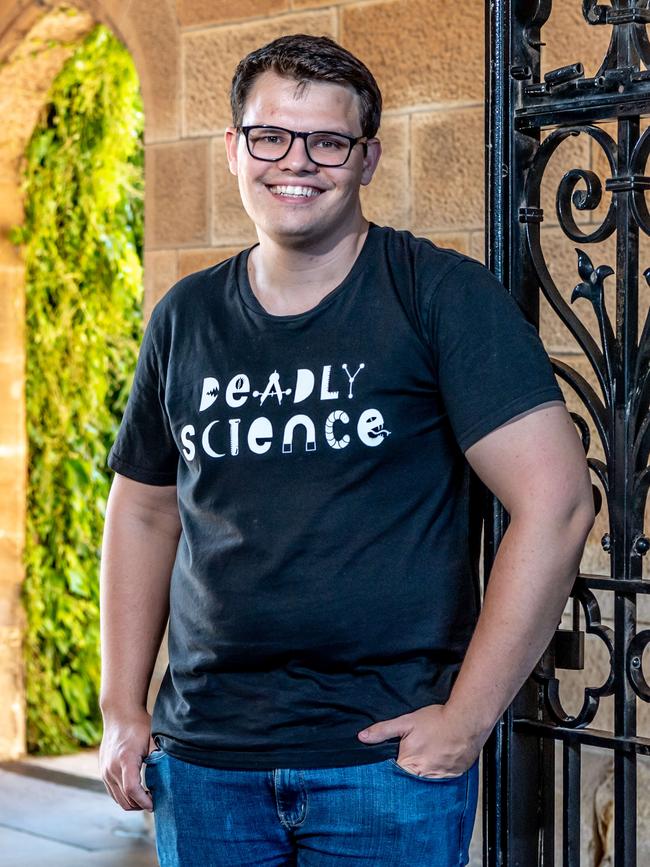
From “a rough childhood early on”, Corey Tutt has not only turned his life around but is on a mission to do the same for other indigenous kids and youngsters from less privileged backgrounds.
The reigning NSW Young Australian of the Year, Tutt, 27, founded Deadly Science in 2018 to donate books and basic scientific resources to remote and disadvantaged schools and help feed the curious minds of youngsters.
“Like a lot of little boys, I grew up with a fascination for animals — and I never really grew out of it,” says Tutt. He lived “all over”, but mostly in Bulli and Dapto, NSW, where he’d catch blue-tongue lizards and bearded dragons and give talks to the other kids about reptiles.
“I did it to make friends,” he says. “I’d find out things about the reptiles — my cool party facts — to make them go ‘wow’. That was my introduction to the sciences.”
A book given to him by his grandfather — like Tutt, a Kamilaroi man — when he was only six years old is one of his earliest memories.
“It was Australian Reptiles in Colour and my Pop got it from an op shop for my birthday,” he recalls of his beloved grandfather, who died in 2011. “It was a science book so I didn’t understand a lot of the terminology, but I got a pencil and ticked off every reptile I found. I remember seeing a lace monitor digging into a termite mound, and I knew exactly what it was doing — it was going to lay its eggs.”
Tutt credits his sister Tarra, just five years older than him, for “pretty much raising me”. He says a lot of the time “we had to fend for ourselves” and she cooked for him, read to him and remains “my best friend, she’s so inspiring”. He desperately wanted to be a zookeeper, but his high school careers adviser told him he should stick to a trade, or “I could end up in jail, or even worse.” Tutt persisted and after a variety of roles working with animals, today he’s a research assistant at the Matilda Centre for Research in Mental Health and Substance Abuse at the University of Sydney.
Deadly Science is his proud passion. “I want to show kids from all backgrounds that they have the ability to dream and understand the world around them,” he says. “A lot of the time in underprivileged areas, it’s boredom (that leads to disengagement). Asking questions is science — and science is hope.”
He hopes “to build an organisation that outlives me. It’s only to Australia’s benefit to have strong relationships with indigenous people. We are all from the same country now — Aboriginal people know this is shared land now, and we need to walk together”.
The managing director
Anthony Wilson: co-founder and managing director, Nood Australia
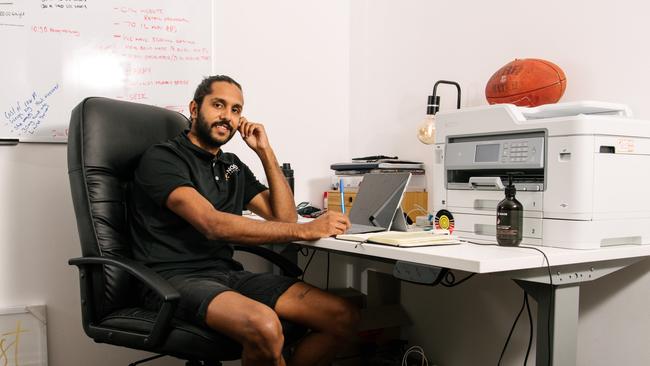
He had two cracks at a teaching degree, but Anthony Wilson says he “didn’t really fall in love with it in the way I thought I would”. So for about eight years after finishing Year 12, he bounced around in a few different jobs, including a traineeship in sports administration while also playing Aussie rules for Norwood in South Australia.
“I was fortunate to be paid as a professional player, and train with some incredible footballers,” says Wilson. “Footy’s been amazing for me, but I wasn’t a top player. I wasn’t drafted until I was 22 and I’ve only played about 14 senior games at state league level, so I always knew it wasn’t the be all and end all for me.”
Wilson, a Ngarrindjeri and Kaurna man with family ties to the Narungga and Arrente country, is one of eight kids and recalls having bush medicines and creams when he was growing up, though he didn’t pay much attention.
“As a young person, you indulge in your culture in your home life, but at school not so much and I probably shied away from it a little — I didn’t want to learn,” he says.
As he matured, his curiosity about his culture grew and he saw using native botanicals in commercial products as “a way for me to not only share culture but also continue to learn about mine, and learn about different Aboriginal cultures across the landscape, and what different botanicals they use, and why and what properties they hold”.
In 2018, he partnered with husband and wife Bronte and Nicole Hough, owners of an established South Australian cleaning and packaging business Salute, to form Nood.
Says Wilson: “Our values align, though sometimes Bronte will call me at 7pm on a Wednesday night when I’m cooking dinner — but that’s a start-up business!”
In June last year, they launched their first range, comprising seven commercial cleaning products ranging from floor and bathroom cleaners to a hand sanitiser, all with native botanicals.
“We wanted to take away harsh chemicals and use native oils and extracts in our formulas,” says Wilson, 27.
In the past 12 months, they’ve worked with a lot of big companies.
“The indigenous Procurement Policy has been a massive help, and also quite a learning curve for me on how it all works, and the amount of work that goes into supplying some of these companies,” he says.
Despite the pandemic, business continues to grow fast, and Nood has aspirations for a retail presence, too.
“For me the business has to be bigger than financial reward, it has to be about learning and teaching and growing myself, and also about giving back to communities and creating opportunities for Aboriginal people.”
That includes working with indigenous communities to grow and harvest botanicals for the products, and he also hopes to set up a Nood Foundation to offer educational scholarships. “Aboriginal people live in two worlds — one is our cultural world, the other is the Western world,” says Wilson. “I want to help other young Aboriginal people understand that they need to be educated in both aspects to walk confidently in both worlds.”



